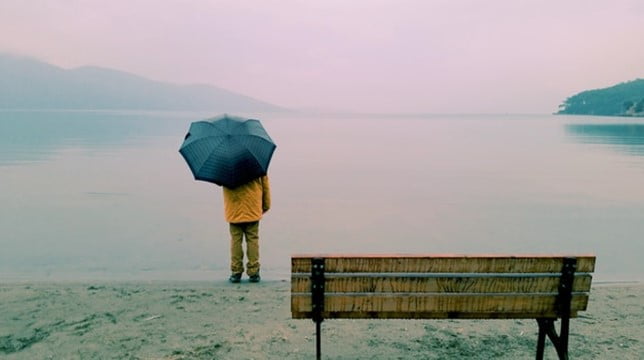As an Amazon Associate, we earn from qualifying purchases made on our website. If you make a purchase through links from this website, we may get a small share of the sale from Amazon and other similar affiliate programs. You can read our complete disclaimer for more details.
We’ve all been there, we buy some bait, we prepare our tackle and equipment, we put everything on the car and, and just before leaving the house, it starts to rain.
Nothing can be more frustrating for a surf angler, especially if he was planning the fishing trip several weeks ago.
In a situation like this, most fishermen will unload the car and return home for some beer or coffee until the rainstorm goes away.
But is it the right thing to do ? Should rainy weather prevent us from fishing ? And is surf fishing good in the rain ?
Me too I would return home if the rain starts pouring down, and I would rarely be on the beach in rainy weather. Not because rain fishing is less rewarding, not because there is nothing to fish for in the rain, but for the simple reason that it’s not comfortable and can sometimes be dangerous.
Productivity-wise, surf fishing in the rain is good and can be very rewarding. Why ? Because when it’s rainy, the water gets colorful and cloudy, making it safe for small fish to hold and feed, and easy for bigger predators to hide and trick unwary prey.
Moreover, the rain carries nutrients and food deposited in rivers and roads to the sea, bringing more fish closer to the shore in search of these feeding opportunities.
In this article, we’ll discuss in more detail why surf fishing is good in the rain and how the hours before and after a rainstorm can be very productive for shore fishing. So keep reading 😉
Why surf fishing is good in the rain ?
The rain makes the water cloudy
When the rain is pouring down, the nearshore water turns up and gets cloudier, making it safe for small and medium-sized fish to hide and feed, and for bigger fish to trick and surprise prey. As a result, you should expect to find more fish nearshore in the rain. In addition, the rainy weather comes most of the times with a high swell. This makes more waves to break in the surf zone forming the white water that most fish use as a cover to hide and feed. In addition, a high swell exposes the water surface to more oxygen encouraging the fish to hold in the shallow and to approach the shoreline. Also, cloudy waters make it difficult for fish to see your hook and line, consequently, your bait will look more attractive and more appealing, and you will get more bites. One thing to keep in mind is that the shallower the water, the more cloudy it gets due to the rain and the swell. Therefore, in order to take the most advantage of the cloudy waters during a rainstorm, avoid casting too far and try simply to target the nearest sandbars and cut-offs just a few yards from the shore. We already discussed in a previous article the best spots to target when surf fishing. Give it a look and take notes 🙂The rain moves the water
As I said earlier, in rainy weather, the swell is often high and the surf usually moving. This is so helpful, not only because it turns up the water and makes it cloudier, but also because when the water is moving, the small fish struggle to get away from nearby threats, making it a great time for bigger fish to pursue and catch them. As a result, more game fish will be looking for food in a heavy swell, as it’s easier and less energy-consuming to pursue and find food. Moreover, when the water is moving, it stirs up and exposes the nutrients hidden between the weeds and under the sand giving more feeding opportunities to fish. Because of that, large fish living offshore know that every time the water in the surf zone starts to move, there may be some meals out there, and thus, they get closer anf start looking for them. However, keep in mind that an extremely high swell is not favorable to surf fishing. Why ? because it is difficult to navigate in a very strong current, not only for small fish but also for the big and large ones. Moreover, a very high swell is often assosiated with a low atmospheric pressure, and when the pressure is low, fish get uncomfortable and seek other deeper areas with a higher pressure. Therefore, I would never cast the line when the swell exceeds 8-10 feet. In such surf conditions, there must be nothing to catch and most fish must have moved offshore in search of calmer waters. Read more about the effect of air pressure on surf fishing.The rain brings big fish nearshore
During a rainstorm, the freshwater travels from land to sea through the roads and rivers, and when it reaches the beach, it forms a clear cut-off line that separates the fresh and saltwater. In a situation like this, most fish prefer to stay on the salter side, and thus, they concentrate on the seaside of the cut-off and keep moving offshore as the freshwater keeps flowing on the beach. Opportunistically, large predatory fish take advantage of this situation and approach the cut-off line, waiting for the smaller fish to escape the freshwater. Therefore, deploying the bait near the cut-off line will be beneficial because that’s where the fish are most likely to concentrate, and also because that’s where you have a good opportunity to catch the big fish waiting for prey. In general, you will be able to identify the cutoff line by looking for the color change in the surf zone. the freshwater is generally muddier and brownish because of all the dirt, oils and mud taken from the roads and rivers, while the saltwater is often clearer and bluer. However, this line can not be easily seen unless the rain is too heavy and a large amount of freshwater is flowing on the beach. Otherwise, the freshwater will be neglected compared to the saltwater and will quickly disappear once it reaches the sea. In this case, the fish will not be forced to run seaward and will hold comfortably nearshore. Therefore, if the rain is not so heavy, I wouldn’t bother to look for that cut-off and I would simply cast the line where the breaking waves rise and crash.Surf fishing before the rain
Surf fishing before the rain can also be so rewarding. Why ? Because fish have a great ability to feel weather changes several hours before they occur, and when they do, their feeding activity increases as they become afraid of starving once the weather changes. In other words, when it’s about to rain, the drop in atmospheric pressure makes fish more stressed and more willing to eat because they know that the swell is about to rise and that feeding may become difficult and unsafe. As a result, they start eating as much as they can because they don’t know when their next meal will be. Surf fishing a few hours before the rain is therefore beneficial and you may experience more bites and catches during that time. So keep your eyes on the weather forecasts, and head to the beach before the rain.Surf fishing after the rain
Once the rain stops, the freshwater continues to carry nutrients deposited on the roads and the rivers towards the sea, and thus, more fish will be feeding on these elements nearshore after the rainstorm. Casting the line after the rain will thus lead to more catches and bites, because more fish will concentrate near the shore and wait for food to come from the land. However, you should consider to “catch and release” more often after a rainstorm. Why ? because the rain does not only bring food and nutrients to the beach, it also brings oils, chemicals, and harmful substances. As a result, the fish holding near the shore after a rainstorm may not be good for your next meal. They may have fed on unhealthy things and you don’t want to pass these things to your body. Wait a few days for the beach to wash the shoreline and carry the chemicals seaward, and you should be good to keep some of your catches. Another reason why surf fishing after a heavy rain can be so productive is that a rough rainstorm may prevent fish from eating for a long time, and thus, once the rain goes away, the fish start feeding aggressively in order to compensate for the days they were not able to eat.Last Word
Rainy weather can be very good for surf fishing. The current and the cloudy water during a rainstorm makes it safer and more comfortable for fish to hold and feed near the shore. Moreover, the hours before and after a rainstorm can be prolific too. The drop in the barometer before the rain and the food carried from the roads and rivers to the beach after the rain, change the feeding habits of fish and make them eat more aggressively. However, surf fishing in the rain should be done with a lot of precautions. Rainy weather comes often with a heavy swell and strong winds. Therefore, you must be more careful when casting the line under such conditions, as it can sometimes be extremely dangerous. The use of a long pole (more than 11 feet) is necessary when the action of waves is strong, because this will allow you to reach a good casting distance without approaching the dangerous swell. Waders and wetsuits should also be on your checklist if you want to surf fish in the rain. They will keep your body dry and warm, and you will feel more comfortable to cast for a longer time.Some recommended surf fishing gear(*)
Note (*): If you make a purchase through links from this website, we may get a small share of the sale from Amazon or other similar affiliate programs.
Surf Fishing Survey
Help us provide you with better content by answering simple questions about your surf fishing experience and knowledge.
We will put the collected responses together and turn them into valuable information that will help you catch more fish from shore 😉
Note: No personal information will be collected with your answer.


